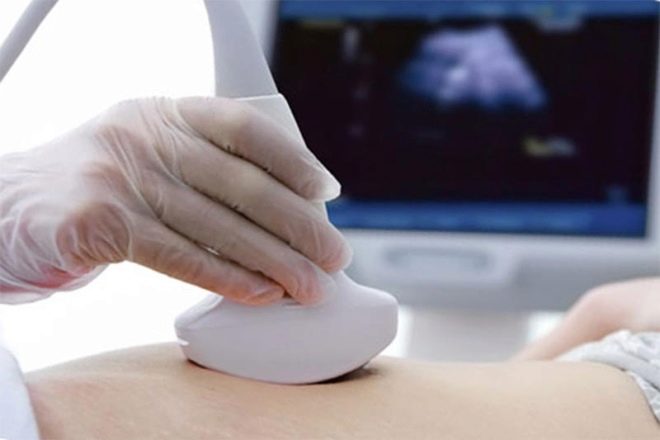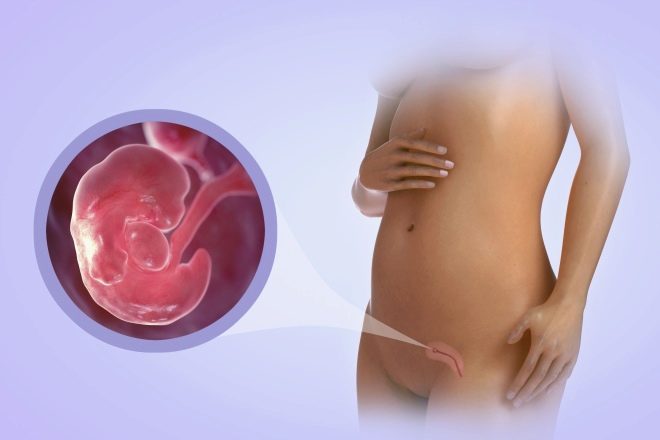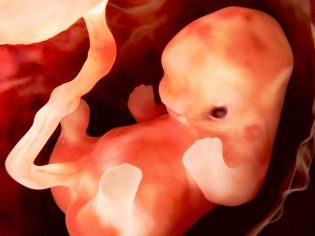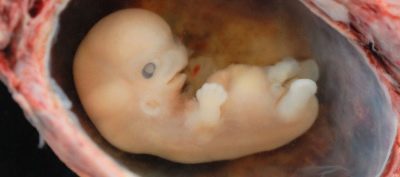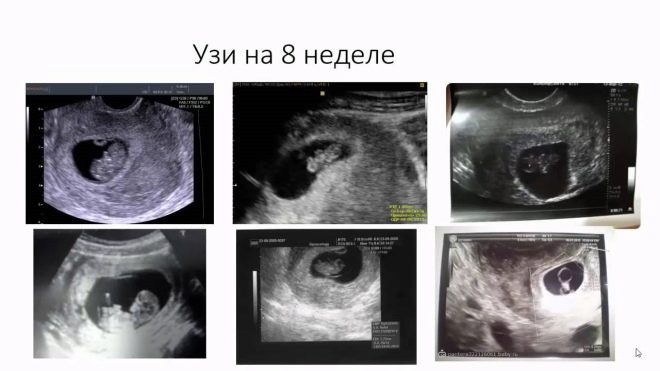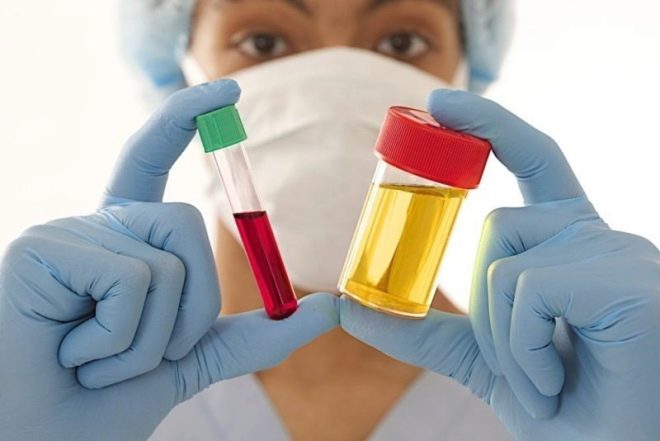Second month of pregnancy
The second month of pregnancy includes the most important for the development of the baby week - the fifth, sixth, seventh and eighth. Embryogenesis is in full swing - a big evolution of a small organism, laying organs and systems. And because the second month is considered one of the most dangerous, associated with various risks.
general information
The calculation of the term of pregnancy in the practice of obstetricians is carried out by obstetric weeks, and exactly 4 such weeks in one obstetric month. But calendar months are different - they are not 28, but 30 or 31 days, February is short and consists of 28 or 29 days. Please note that the calculation of the period is not from the day after conception, but from the first day of the last menstrual period. That is, the term that the doctor says to you is two weeks longer than the embryonic one.
The second month starts at 4.5 weeks from the last month and ends on week 8 inclusive. There is the first trimester of pregnancy - the most important and important for the entire period of gestation. In the second month, the most important metamorphosis occurs with the baby and his future mother.
Baby development
When the second month of pregnancy begins, and this happens within 3 days after the start of the delay, not all future mothers are aware that big changes are waiting for them soon. But the majority are already aware of what is happening (the tests are already “striped”, the blood tests for hCG are positive), and some even started toxemia.
While the woman is dealing with diagnostic issues, looking for ways to present the news in an original way to the future dad, the baby has already come a long way - in the first month he has turned from a single zygote cell into a complex organism that is about to start beating the heart.
He managed to overcome the fallopian tube, to gain a foothold on the wall of the uterus. It receives nutrition and oxygen from the maternal blood, the amnion has already formed, which becomes the fetal bladder, and the chorion, which will become the placenta in the future. Of the germinal lobes, prototypes of the internal organs have already begun to form. The first began to form the heart and great vessels, as well as the neural tube.
At the very beginning of the second month of pregnancy, the baby's heart begins to beat. This happens at the end of the fifth week. AND already on the sixth, you can safely go to the ultrasound roomto listen to how it knocks. While the heartbeat does not differ in rhythm, it can vary from 80 to 110 beats per minute, but it can already be heard if an ultrasound scan is made with a transvaginal sensor. The laying of organs of the urinary system, the intestines and stomach, and skin is in full swing. A chord appears, the small body acquires the right and left sides, and all organs are laid where they are needed.
5 week
This week is the first after the delay. As long as mom thinks which test is better to buy and what the delay in menstruation can be associated with at all, the embryo has achieved a lot, and at the end of this week he will have his own heartbeat. The heart has only two cameras so far, but it is already steadily declining.
The formation of germ cells begins this week. This does not mean that the sex is laid, the sex is known from the moment of conception, it is just that either female or male sex cells are formed according to the genome - XX or XY.
The growth of the baby this week is from 1 to 1.5 millimeters, and the crumb weighs about 1 gram.. The size of the child does not allow to see him on the ultrasound at the moment, at best a dark dot - a fertilized egg will be detected, but you should not count on it much, considering the parameters of the baby. But the heartbeat may well fix the ultrasonic sensor at the end of the week.
6 week
This week, most women consider it their duty to visit the doctor of ultrasound diagnostics - I really want to make sure that there really is a pregnancy, that the embryo has been implanted and entrenched successfully. It is already possible to see the baby, more precisely, to see the fetal egg in the uterus. The size of the baby is still small, but they have doubled, and this in itself is incredible: height of the child - 3.4-4 mm, and weight - within 1.5 grams.
An immune system is formed, its most important organs are laid, in particular, the thymus gland. There, where handles soon appear, characteristic protruding hillocks appeared, and where eyes should be, dark points appeared - the rudiments of the organs of vision. Small dimples appeared on the sides of the head. They will become ears in the future.
The embryo looks like an alien creature, so far there is nothing of the human form in it. The big head, eyes are points on its sides, the fetal tail. The baby does not know how to move, but very soon it will learn this, as the formation of the neural tube, which will become the brain and spinal cord, is in full swing.
7 week
This week corresponds to the fifth embryonic, it means that the baby has been with you for five weeks already, and it has become big - Its weight is 1.5 grams, and growth reaches 6 millimeters. On ultrasound, the ovum is determined unmistakably. If you compare your child with something tangible, it will look like a small grain of white beans. There is an embryonic period, the baby is still referred to as an embryo. He begins to lay the first nerve fibers, and already at the end of this week, he will begin to move, albeit unconsciously - reflexively.
This week, begin to form eyes baby. Right now, you need to consume vitamin A in accordance with the daily need, not more. The intestinal tube begins to divide into sections, which then become the pharynx, esophagus, stomach.
The heart of the baby becomes like ours - it already has 4 cameras, the baby’s body begins to circulate blood without fail. A genital tubercle appears in the place where the genitals will later be. In girls and boys on this term, the hillocks look exactly the same.
This week, the chorion forms the primary placenta with a thickness of about a centimeter, the type of blood flow changes, the products of the baby’s metabolism begin to enter the woman’s body. That is why, at this period, toxicosis most often starts or intensifies.
8 week
The most active this week is the nervous system. It is formed the fastest. The brain of the crumbs has already separated from the spinal, the cerebellum is emerging. The formation of nerve fibers in a small body continues. Baby height - 2.5 centimeters. It resembles a grape. The design of the face begins and the formation of the vulvar tubercle of the external genital organs starts according to the type envisaged by the genome - male or female. Gender is not yet possible to determine.
The embryo still maintains this status. In the third month of pregnancy, it will begin to be called more respectfully - “fetus”, but this will happen no earlier than 9-10 weeks, when the embryonic period of the child’s development is completed.
What does a woman feel?
The main sign and symptom of pregnancy at the beginning of this month is the absence of menstruation. It is this fact that can lead a woman to the idea that she is not alone now. Menstruation does not start because a high progesterone level interferes with this process. This hormone begins to be produced immediately after ovulation.It prepares the endometrium for implantation, making it thicker and more friable, it partially suppresses the immunity of the woman, so that aggressive immune cells do not regard the embryo as an alien object to be destroyed. Low levels of progesterone can lead to miscarriage at an early stage.
All the changes that occur in the body of the future mother in the second month of pregnancy, one way or another connected with the action of progesterone. This hormone has a lot of side effects, which manifest themselves in the quality of certain symptoms.
The most frequent feeling on this period is a slight nausea, especially in the morning. In some women, severe toxicosis begins by week 5-6.. The mechanism of its development has not been studied enough, but there is an assumption that it is closely related to the response of a woman’s immunity in response to the suppressive action of progesterone. The stronger the female immunity (the healthier it is), the stronger the signs of toxicosis can be.
Nausea can cause not only food or odors. It can be practically causeless. If vomiting episodes are repeated more than 7-8 times a day, you should consult a doctor to prevent dehydration.
The second most common symptoms are heartburn and constipation. Both are also side effects of progesterone. Since the hormone reduces muscle tone (this is important so that the uterus is as relaxed as possible), the tone of the rest of the muscles of the internal organs decreases, which leads to constipation and heartburn.
Usually in the second month there is a change in taste preferences.. If a woman did not like strawberries before, right now she may uncontrollably want to eat her, some want pickled cucumbers, some want meat. In general, it is quite individual. We immediately say that addictions in food do not affect the sex of the child and cannot talk about it - women who ate pickled cucumbers and gave birth to a girl, are found no less often than women who ate sweets and eventually gave birth to a little boy.
The mammary glands are enlarged. A woman can pay attention to this immediately after the delay. The nipples become more sensitive (the mammary gland is hormone-dependent, it responds quickly to changes in hormonal levels). Blood supply to the breast is improved, small bluish blood vessels may appear, and so-called Montgomery hillocks may appear on the areola circles by 6–7 weeks.
Due to the fact that the blood supply to the pelvic organs becomes more active, the frequency of urination increases. It is important to ensure that it is not associated with any pain or change in the color and clarity of urine. This may be a sign of cystitis, pyelonephritis.
Cystitis is exacerbated in the second month quite often, since immunity is reduced, and bacteria from the intestines may well enter the urinary tract and bladder, causing inflammation. Pleasant changes can occur in the appearance of the future mother - the skin under the action of progesterone becomes more elastic, beautiful, the woman seems to glow from the inside, her hair becomes more shiny, and on the cheeks due to the increased blood volume in the body often plays a beautiful glow.
The size of the abdomen does not differ from the state of the non-pregnant - it is not yet possible to determine an “interesting position” from it. But the woman herself can already begin to feel quite pregnant to herself - a little heaviness, a feeling of fullness in the lower abdomen - normal sensations, because the uterus has already begun to grow, her blood circulation has changed.
Discharges are normal in the second month remain transparent or milky, without clots or other inclusions. A variant of the norm is also considered yellowish discharge - in such a color stains them with progesterone, which started large-scale processes of restructuring the female body to the needs of the fetus growing in it.
In addition to the above, this month, most women note these feelings:
- increased drowsiness, which does not recede even after a sufficient night's sleep;
- instability of mood (a woman is sentimental and whining, then irritable and aggressive);
- excessive drooling (especially at night and in sleep);
- headaches (usually in the afternoon and evening);
- sleep disturbance, insomnia, anxiety and anxiety.
What tests and analyzes are needed?
Usually in the second month, women are registered at the antenatal clinic. The best time for this is considered a period of 6-8 weeks. But the future mommy can be registered at any other time, it’s just that the doctor at the reception can confirm the fact of pregnancy. Do not delay the visit to the doctor - early terms are the best period for identifying possible risks and pathologies, besides, for early registration (up to 12 weeks) a woman from the state will have a bonus - a small lump sum.
When registering pass:
- general and biochemical blood tests;
- coagulogram - analysis of blood clotting factors and determination of hemostasis processes;
- blood test and Rh factor (if a woman has a negative Rh, the same test should be taken by her spouse or the child’s biological father in order to assess the likelihood of Rh conflict);
- blood for HIV status, syphilis, hepatitis B and C;
- blood for infectious diseases (TORCH);
- general urine analysis;
- vaginal smear.
In addition, a certificate from a general practitioner or any other specialized medical specialist may be required if a woman has chronic diseases (for cardiac pathologies from a cardiologist, for stomach problems from a gastroenterologist, etc.). An ultrasound scan is also done to make sure that the pregnancy is uterine, that the baby is developing, that it is viable. Count the number of fetuses in the uterus, assess the condition of the cervix and ovaries.
During the second month of pregnancy, no X-rays should be taken, methods of invasive and non-invasive prenatal diagnosis are not applied.
Possible problems and complications
What complications can be in the current period, it is difficult to answer unequivocally.
The most common pathologies such as:
- risk of miscarriage (lower abdomen, bloody or brown discharge, there are signs of deformation of the ovum by ultrasound, reduced concentration of progesterone hormones or hCG);
- retrochial hematomaformed on the site of a small detachment of the chorion from the uterus wall (there are spotting secretions from the genitals, there may be weak aching pain in the lower back or lower abdomen);
- anembryonia (absence of the fetus in the ovum) is determined by the results of ultrasound;
- ectopic pregnancy - fixation of the ovum outside the uterus, for example, in the tube or cervix;
- missed abortion - stopping the development of the fetus and its death due to genetic abnormalities or the negative impact of teratogenic factors.
Considering that a woman has reduced immunity, important to guard against infectious and viral diseases, because right now they can be the most dangerous for a baby growing in the womb. Also It is not recommended to take medicines (especially antibiotics and psychotropic drugs) without the permission of the doctor. Most drugs have a teratogenic effect on the fetus and can lead to the formation of his body with errors - to developmental defects.
Recommendations
This month will pass in the most favorable way if a woman adheres to the following tips.
Walk more in the fresh air, go on foot - now it will be beneficial, especially if there is toxicosis.
Carefully watch your condition and any changes. With the appearance of abnormal discharge, pain, frequent nausea, it is important to consult a doctor as soon as possible. Up to 90% of all pregnant women with the threat of miscarriage, with timely treatment, preserve the pregnancy and give birth to perfectly healthy babies in due time.
Take care of your own food. The second month is the best time to make your diet and start following it. Sate it with fresh vegetables and fruits, dairy products, protein foods. If you are a vegetarian, make an exception and start eating fish, eggs and milk in small quantities. The child is now in dire need of protein, it is the building material for his organs.
Eat fractionally - 4-5 times a day in small portions. This is especially important if tormented by toxemia. Starve and overeat can not.
Sex in the second month of pregnancy may be prohibited. only for those who have revealed pathologies of pregnancy - the threat of miscarriage, retrochorial hematoma, progesterone deficiency. In each case, drug treatment and sexual rest will be prescribed.
Fly by plane, go on a trip on this period is not prohibited. But you should focus on your own feelings. If nothing bothers you, feel free to go on a business trip or vacation. The main thing - do not overheat in the open sun on the beach and do not freeze in the glaciers of Greenland. Everything else is perfectly acceptable.
Do not downplay the effects of stress on the body.. At this time, when embryogenesis is underway, it is important for a woman to remain calm at all costs. If someone or something puts you off balance, remember that stress hormones need to be released (nervous, experienced fear, anger, irritation - walk on foot, wash the dishes, adrenaline is gradually “utilized” with muscle actions). The accumulation of stress on this period can cause miscarriage, missed abortion, fetal malformations.
Visit the doctor. This month it will be enough to do it once.



